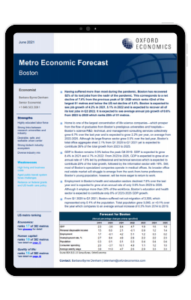US | Metro Economic Forecast: Boston

Having suffered more than most during the pandemic, Boston has recovered 52% of its lost jobs from the nadir of the pandemic. This corresponds to a net decline of 7.6% from the previous peak of Q1 2020 which ranks 42nd of the largest 51 metros and below the US net decline of 5.6%. Boston is expected to see job growth of 4.2% in 2021, 5.1% in 2022 and is expected to recover all of its lost jobs in Q3 2022. It is expected to see average annual job growth of 0.6% from 2023 to 2025 which ranks 28th of 51 metros.
What you will learn:
- Home to one of the largest concentration of life science companies—which prosper from the flow of graduates from Boston’s prestigious universities and hospitals—Boston’s science R&D, technical, and management consulting services collectively grew 6.7% over the last year and is expected to grow 2.2% per year, on average from 2022-2025.
- GDP in Boston remains 0.3% below the peak Q4 2019. GDP is expected to grow 8.4% in 2021 and 4.7% in 2022. From 2023 to 2025, GDP is expected to grow at an annual rate of 1.8% led by professional and technical services which is expected to contribute 20% of the total growth, followed by the information sector with 16%.
- Employment in Boston’s health and education sectors declined 7.8% over the last year and is expected to grow at an annual rate of only 0.6% from 2023 to 2025. Although it employs more than 20% of the workforce, Boston’s education and health sector is expected to contribute only 8% of 2023-2025 GDP growth.
Tags:
Related Services

Post
APAC Key Themes 2026: Paybacks, policy offsets and trade
We believe APAC will remain the strongest global performer in 2026. However, the growth trajectory will likely be more uneven than in past cycles.
Find Out More
Post
Japan’s fiscal policy will remain loose, which increases risks to debt sustainabilit
We've changed our fiscal outlook for Japan in our December forecast round. We now expect the new government to set a primary deficit close to that of 2024, at 2%-3% of GDP for 2025-2027, instead of restoring a balanced budget by taking advantage of strong tax revenue. We assume higher bond yields will force the government to take measures to reduce the deficit from 2028.
Find Out More